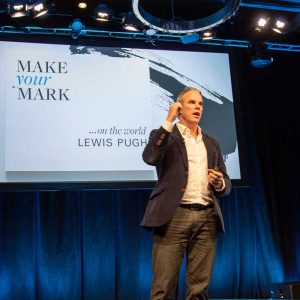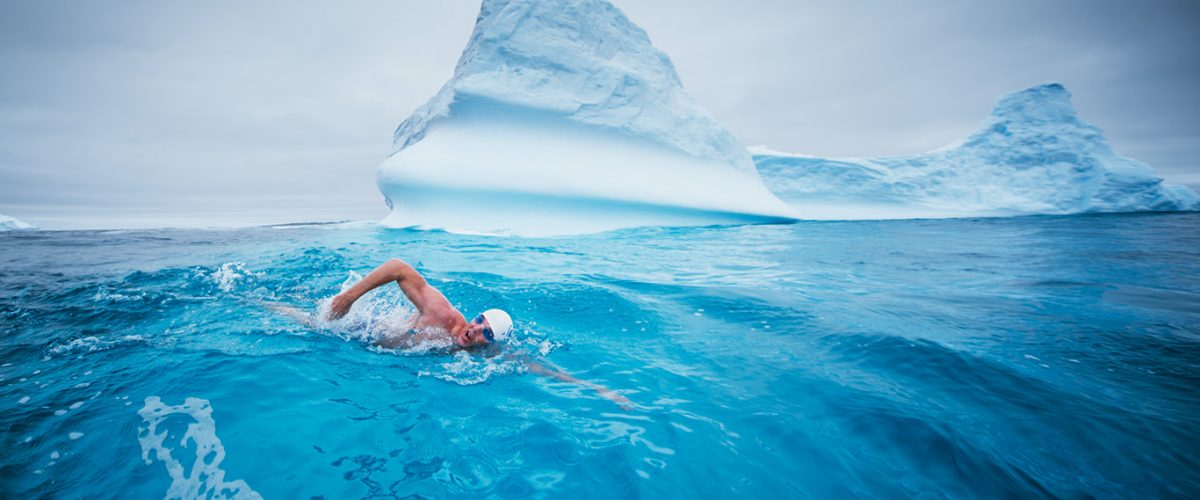Stroke of geniusx
The extraordinary story of swimmer Lewis Pugh.
He’s a former maritime lawyer, a record-breaking ocean swimmer and UN Patron of the Oceans. Meet Lewis Pugh, the world-renowned environmental campaigner who spoke at our Global Partner Meeting this February. Here’s his story.
There is a place on Earth where few men have ventured; where the air is so cold that sea spray turns to ice in mid-air.
It’s a vast wilderness of extremes, a place where life is fragile and nature rules. It’s also one of the most beautiful places on the planet.
This is the Ross Sea in Antarctica – at the heart of the most southerly place on Earth. Few people get to see it, let alone swim in it.
Then again, few people are like Lewis Pugh.
This former lawyer, passionate environmental campaigner and record-breaking swimmer has made it his life’s mission to preserve the seas. And he’s willing to do just about anything to make his case.
In 2015, Lewis won worldwide acclaim for completing three swims in the freezing cold waters of the Ross Sea as he strived to raise global awareness of the importance of giving the area protected status.
“The Ross Sea is a terrifying but awe inspiring place,” he explains. “When you see a humpback whale surging out of the water with a mouthful of krill, or the beauty of a colony of emperor penguins, you know you are in one of the most incredible places in the world. It’s a place worth fighting for.”
Diving into danger
The Ross Sea is the domain of an extraordinary array of wildlife, as dangerous as it is awe-inspiring.
“When I committed to the swims I knew I had to respect the wildlife as much as the life-threatening temperatures,” Lewis says.
“The sea is home to killer whales and leopard seals, which can literally open their mouths 180 degrees to show off fearsome rows of razor-sharp teeth.
“I was well aware that, if one of those grabs hold of you, they can drag you under in an instant.”
As if the perils of the swim itself weren’t enough. With air temperatures of -37 degrees C (-34 degrees F) and water temperatures of -1.7 degrees Centigrade (-29 degree F) , getting into the freezing sea itself is fraught with danger.
“For the first minute it was just sheer panic,” says Lewis. “I couldn’t breathe, I was gasping for air and, after just one minute, I could see my fingers had turned completely white.
“Somehow I managed to keep swimming along the edge of the ice-shelf until, after five minutes, I realized I’d lost control of my arms and that, if I didn’t get out immediately, I’d die in the water.”
Making an impact
He pushed his life to the limits, but Lewis’s extreme swim had the impact he’d hoped for – his achievement captured the imagination of the world media. Most importantly, it propelled his campaign to save the Ross Sea into the global spotlight. But the real battle had only just begun.
“The struggle to create a marine protected zone (the equivalent of a national park) in the Ross Sea had dragged on for 15 years, with 23 of 24 countries signing up, but with Russia blocking the agreement. So I made it my mission to try and change their minds.”
Following some advice from the Archbishop Desmond Tutu, Lewis began a series of diplomatic missions to Russia, during which he struck up an unlikely relationship with Russian ice hockey legend Slava Fetisov, who introduced him to a stream of influential government figures.
“Cold-water swimming is very popular in Russia. As children, Russians are taken to frozen lakes by their parents, who cut a hole into the ice for them to jump in. Russians know cold. They could relate to what I was doing, and they saw I had come as a person, an individual, a sportsman and an ocean advocate. That gave me unique access.”
After shuttling back and forth to Moscow for two years, and just as Lewis was ready to give up, President Putin appointed his former KGB colleague and Chief of Staff Sergey Ivanov as Ecology Tzar, and it gave Lewis the opportunity he needed to strike a deal.
“I had a gut feeling it would work,” he says. “I always thought that if the arguments were presented properly to President Putin, he would agree to it. He would see the injustice and act.
“And more than just putting a persuasive argument to them, I also listened to what they had to say. I didn’t go in looking for a confrontation, but rather I tried to find a point of mutual understanding. I think that made all the difference.”
In October 2017 Russia became the final country to sign up to the agreement to establish the Ross Sea a Marine Protected Area. At two million square kilometres in extent, it’s the largest protected area in the world – it’s the size of the UK, France, Germany, Italy and Spain combined!
The battle continues
The feeling of elation was just incredible, but Lewis is all too aware that his job is far from done.
“Over the years I struck up a close relationship with the late Dr. Ian Player (the brother of golfer Gary Player),” he says.
“Ian was a game warden in South Africa and is credited with saving the White Rhino from extinction and I’ll always remember him telling me that the battle for the planet is not like the Battle of Waterloo.
“That’s because, while some battles finally end a conflict, the fight to preserve the Earth will continue forever. It’s going to be fought by us, by our children, and by all future generations.”
Born to make a difference
Lewis was born in Plymouth, England, and always had a passion for exploring but, after moving to South Africa at the age of 10 in 1980, he decided to study law at the University of Cape Town.
He says: “My time at university was an inspiration. I actually started my course a day after Nelson Mandela was released from prison and my lecturers included Archbishop Desmond Tutu and civil rights campaigners who had been incarcerated fighting against apartheid.
“My legal skills have also been invaluable during my campaigning. Law teaches you the importance of making a passionate argument, but of separating it from emotion, being an advocate and getting your message across succinctly and diplomatically.
“I honestly don’t think I’d have had any success in my negotiations with Russia without my legal grounding.”
University was also the place where Lewis began to take an interest in swimming and, having spent several years working for various maritime law firms, his life took a unusual turn.
Due to his passion for travelling and exploration, he applied for several expeditions to Antarctica unsuccessfully, before deciding to take matters into his own hands.
“Having been rejected a few times I realized the only way I’d get to Antarctica would be if I led an expedition myself,” he says. And so his love affair with the polar seas began.
The story continues
Lewis was appointed the first UN Patron of the Oceans in 2013 and, this summer, will launch a campaign to encourage countries around the world to set aside 50% of their waters as ‘no-take zones’, free from fishing, oil and gas exploration etc.

This February, following a personal invitation from Chairman Hugh Verrier, Lewis was also a guest speaker at our Global Partner Meeting in New York. Lewis spoke to our partners as part of our ’Make Your Mark…’ series of talks, where he described his experience with the Ross Sea campaign and his perseverance to succeed and make a mark on the world.
Lewis says: “What really impressed me at the meeting was hearing about the variety of pro bono work you are involved in and the genuine passion to make a difference.
“Law has unlimited potential to have a positive impact on virtually every problem the world faces at the moment – from poverty, to conflict, gender equality, the environment and justice.
“White & Case is clearly already passionate about its role as a global citizen and I’d encourage you never to rest in your efforts to make the world a fair and just place.”





